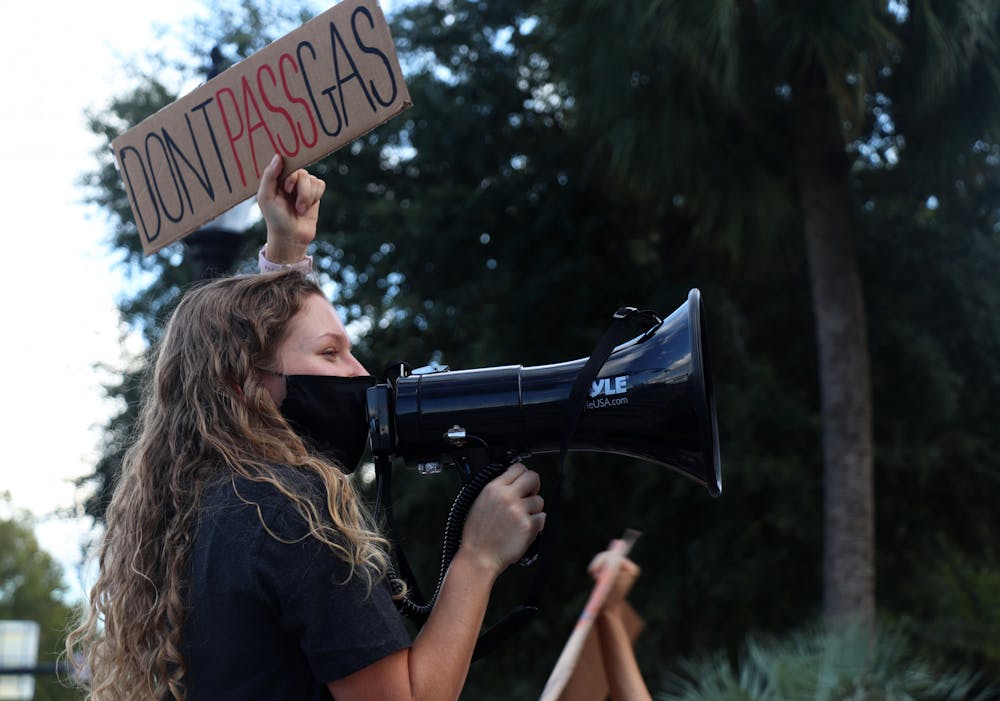Students donning Gator shirts wander through a maze of closed-off streets on the University of Florida campus.
Obscured behind some of the green fences and striped barricades, construction services the university’s steam pipes. Students are mostly oblivious to what resides beyond the gates, said Stephen Mulkey, a UF sustainability professor.
“I walk into the university and my heart just breaks,” Mulkey said. “How dare they do that to the future of these kids?”
The power plant approved over summer is anticipated to operate on natural gas, which primarily consists of methane. Mulkey said it is morally reprehensible to use a greenhouse gas like methane at this crucial juncture in history, where the fate of young people is riding on these long-lasting decisions.
The UF Board of Trustees approved the Central Energy Plant Project in June to the dismay of some staff and students. Protesters booed the board’s approval, which they said was made over Summer when many students were off campus due to the COVID-19 pandemic — leaving many students to find out about the university’s plan less than three months before its final decision in December.
After about 50 protesters demanded the university administration halt the gas-fired energy plant Sept. 24, UF President Kent Fuchs explained the board’s vision for moving the project forward Tuesday.
Fuchs said the initiative is critically important and will help the university meet energy demands for the growing campus and support research efforts.
The plant will produce both steam and electricity while balancing efficiency, cost-effectiveness and environmental considerations, Fuchs said. The facility will be located on Gale Lemerand Drive.
“We can’t wait to move forward on this far-reaching effort,” Fuchs said.
But chants heard by passersby on the corner of University Avenue and 13th Street like “No more oil, keep our carbon in the soil!” and “Divest! Divest! It’s in our best interest!” demand a different approach.
Climate Action Gator President Makenzie Griffin led the protest charge in an attempt to stop UF’s plans for a gas plant that will be in commission for decades. The protest’s goal was to push the university away from outdated technology and toward more sustainable options, such as renewable energy.
“We don’t want empty promises anymore,” said Griffin, a 22-year-old zoology senior.
Griffin pointed to UF’s commitment to reach carbon neutrality by 2025, which she said is not possible if the university only reduces emissions by 25%.
She wants to see UF follow the example of other universities in the nation that were able to reduce carbon emissions by more than half through solar energy. Climate Action Gator is working to present a solar proposal to UF with logistics and pricing.
As UF approves gas-fired energy plans, Harvard University said it will end all of its investments in fossil fuels, according to the Washington Post.
“It gives me hope that other universities are going to follow suit, especially our own,” Griffin said. “But it’s also disheartening that UF doesn’t seem to talk much about their investments.”
While UF provides an education to its students, she asked what good that education is if there’s no future to apply it in.
“Do better,” Griffin said. “Follow in the footsteps of these other top universities who have shown that it’s possible to do better…I know that UF has the money and they have the land. Use it the way students want it to be used.”
Despite opposition from students and staff, UF General Counsel attorney Colt Little said the plan will drive substantial improvement for the university’s carbon footprint.
“The University of Florida has ambitious green energy goals,” Little said.
The Central Energy Plant Project will be the university’s largest source of energy, anticipating a 25% reduction to its overall carbon footprint, Little said, which is roughly the equivalent of shifting 18,000 U.S. homes to zero-emission electricity on an annual basis.
The reductions come from improving UF’s steam supply efficiency, shifting about 60% of campus electricity from the grid, applying a combined heat and power approach and reducing the distance electricity needs to travel.
Little said UF recognizes the plant is only the first step in a larger process to meet environmental goals.
The university is looking for technological solutions that can burn more environmentally friendly fuel sources in the future. But he said there are still financial limitations on those solutions today.
“All this positive, wonderful, forward-looking language, yet the whole damn thing is built on methane — fracked methane,” Mulkey said.
He said methane is the worst energy source UF could use apart from coal. Methane heats the climate over 80 times more than carbon dioxide in the first 20 years after it enters the atmosphere. After 20 years, most of the methane becomes carbon dioxide, which can last centuries.
Currently, UF’s steam needs are primarily met through a Duke Energy-owned and operated central cogeneration facility, UF Vice President of Business Affairs Curtis Reynolds said.
The Duke Energy Facility has been in operation for 25 years and is nearing the end of its service life and contract, Reynolds said, which will be decommissioned by the end of 2027.
The facility is not directly connected to the university’s electrical distribution system. UF is a retail customer of Duke Energy. On an annual basis, UF purchases more than 750,000 pounds of steam, he said, which is supplied to over 131 campus buildings.
“Through this effort, we would like to achieve steam independence,” Reynolds said.
The proposed energy project outlines three construction efforts: a central energy plant, thermal utility infrastructure and an electrical distribution system. None of the university’s existing infrastructure will be sold as part of this process, Reynolds said.
After scouring UF’s webpage statements, Mulkey said he struggled to find a single mention of methane, showcasing a lack of transparency.
“It’s breaking trust with future generations at UF to invest in methane-fired — any kind of fossil fuel — at this point,” Mulkey said.
Instead, he said the energy plan should progressively move UF to strictly renewable sourcing.
UF spokesperson Hessy Fernandez didn’t provide a response on UF’s current carbon dioxide and greenhouse gas emissions nor expected emissions for the new plant.
“At this time, the university cannot provide an exact amount of greenhouse gases content as we do not know the specifics around the plant,” Fernandez wrote in an email Saturday.
The contract will be for 25 to 35 years. Construction of the Central Power Energy Plan is expected to begin in 2023, with the facility located on the south side of the commuter parking lot on Gale Lemerand Drive and south of Museum Road, Fernandez wrote.
Mulkey believes the plant goes against the mission of an institution of higher learning: maintenance and renewal of civilization.
“We don’t need any more science,” Mulkey said. “The science is stark, and the reality is right in our face. What we need is political action. We need to act.”
Contact Alexandra Harris at aharris@alligator.org. Follow her on Twitter @harris_alex_m.

Alexandra is a senior journalism major reporting on Science/Environment for The Alligator. Her work has appeared in The Gainesville Sun, and she filed public records requests for the Why Don't We Know investigative podcast. She has a passion for the environment.






